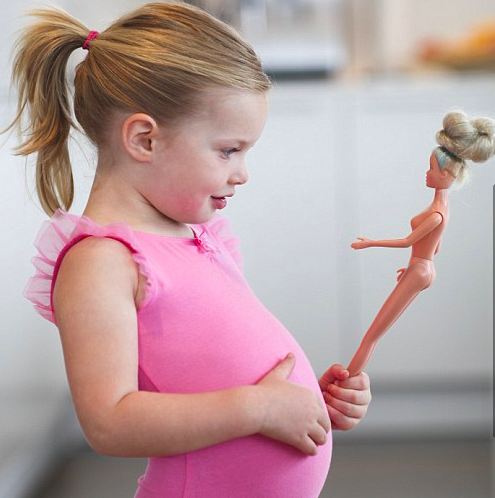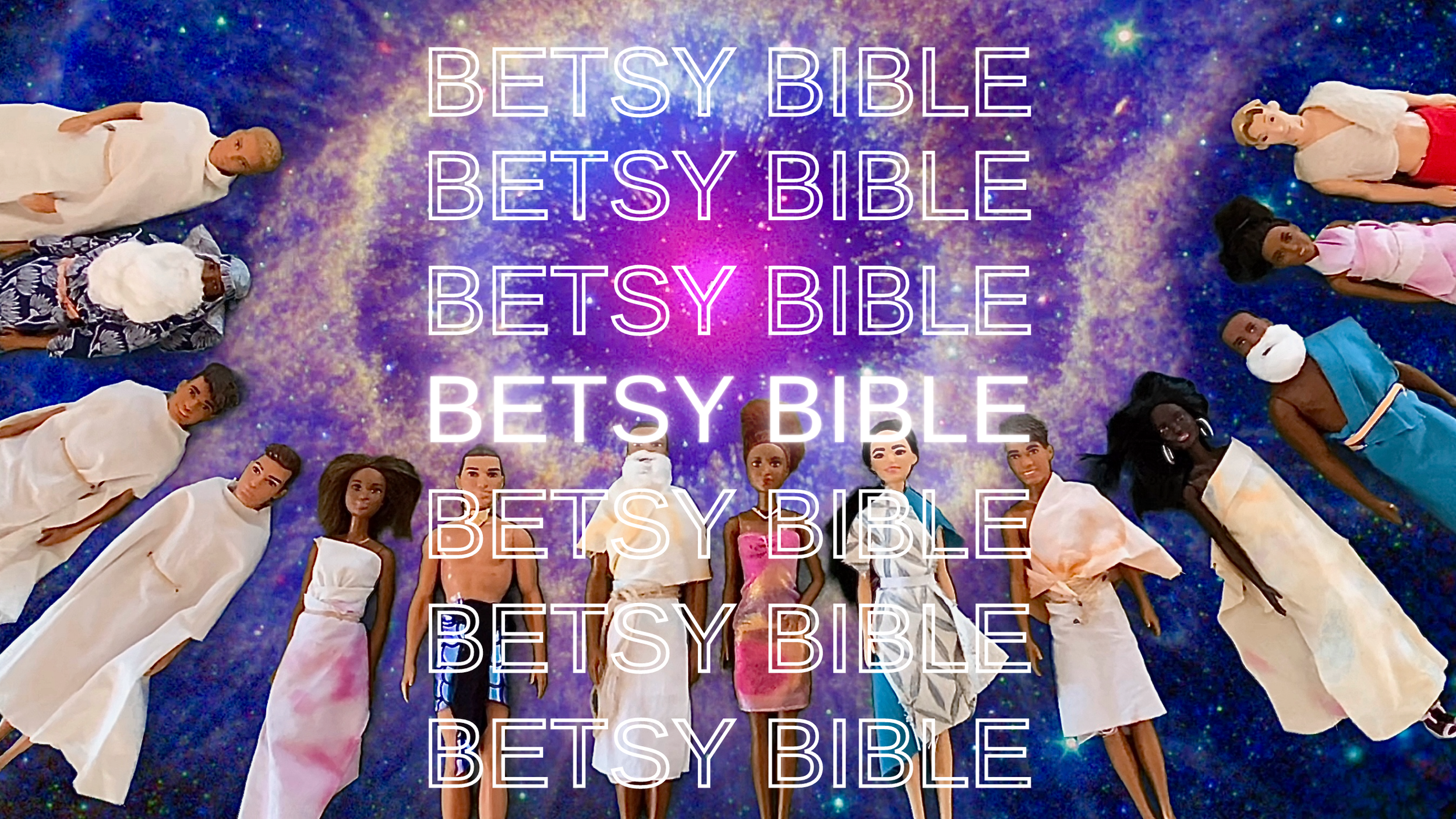Barbie Redemption
Criticism and concern for youth motivated Mattel to create a range of body types for Barbie to better reflect reality.
I hated dolls and Barbies growing up. Looking back, I can see why. An eating disorder was brewing in my childhood, which made the human figure burdensome. Yet something surprising happened, which has tickled my testimony. I will share a bit of my story “through Barbie’s eyes.” I will end with an unexpected redemption with this toy I used to hate.
As a child, I was into animals. My husband, Sean, loved Legos. Yet somehow stuffed-animals + Legos = daughters who loved dolls! Barbies. Tiny Disney princess figurines. On occasion, American Girl dolls. As their mother, my girls’ toys were a stretch for me because I really didn’t like dolls, Barbies or princesses growing up. (There was one exception: my mom gave me a dress up box full of her old New York City debutant ballgowns. Only when my childhood friend, Laura, came over did the inner princess come out. We reenacted a version of Cinderella, only we were twins who won the hearts of twin princes. Hers was Victor from the Young and the Restless and mine was Tom Burlinson (Australian actor in The Man from Snowy River—horse movie 😉). My dad (an Anglican minister) actually married us once on our deck... even still in this game there were no dolls!)).
Victor from the soap opera, The Young and the Restless
Looking back, part of my repulsion to dolls was that I felt the heavy burden of being skinny, even as a child. I absorbed this message without acting on it until my teenage years. My sister was into ballet: skinniness. My family was always dieting: weight. The human figure felt heavy with body image pressure. Growing up I was an active, strong, food-eating girl. But, when I felt out of control over our move, over the pressure to be a role model (doubly so as a Christian amongst non-Christians), and over unmet emotional needs, the 16-year-old Kate turned to food to numb the pain. The lack of it.
In my distorted thinking, I felt like I finally looked like a Barbie! But really, I was very sick. I had crossed over into obsessing about what to eat or not eat. I would loathe myself if I felt any fat on me. Anxiety would wash over me at meal times, which made it easy to restrict. I felt the rush of dopamine from the hunger - the reward for my “self-control.” I was terribly angry and turned it on myself. I needed help from the outside to untangle me. It took time. My family worried. My new high school intervened and asked me to see a social worker. I did. It did not help. I did not see the problem yet. I was in denial for three years before my mother asked me to get help from The Center for Hope in Seattle, Washington. She had read the book by the founder, Dr. Jantz: “Hope, Help, and Healing for Eating Disorders.” She knew I needed professional help to guide me through the reasons why I used food to numb out.
Eating disorders are not about food. In fact, all addictions are not about the behavior—the heroine, the rage, the hoarding. They are about pain, and our destructive response to it.
“Usually, it is not the outwardly rebellious child in the family who develops an eating disorder or pattern of disordered eating. The demonstrative child has ample ways to communicate frustration, dissatisfaction, and even rage. The quiet child, however, does not overtly thwart the power structure but takes on responsibility for the woes of the family. The behavior with food acts as a squeezing mechanism when the sponge becomes painfully full.”[i]
Patient counselors helped me identify where I was hurting. Once I saw where I was trying to fix things that were not my responsibility, once I began to name and grieve the needs that were not met (albeit unintentionally), the desire to love and care for myself resurrected. For the first time, I realized how much I needed the grace of Jesus. It changed me forever. My parents humbly welcomed their 19-year old’s hurt and asked for forgiveness where they had been blind too. We were all sinners saved by the grace of our Lord. They were the greatest Christian witness to me. I have boasted about them ever since.
Unresolved pain fuels all of our destructive patterns, regardless of whether it’s disordered eating, substance abuse, controlling, or panic, the list goes on. On top of that, we are born with a condition that makes us all turn instinctively to penultimate things for comfort. None of us are immune. None of us can turn towards God on our own (Psalm 14, Psalm 53, Romans 3:9-20). But there is good news. “I have not come to call the righteous but sinners,” said Jesus (Mark 2:17). God sent his Savior to us. God has put his testimony of rescue on the lips of alcoholics, food addicts, codependents, and addicts of all breeds. The Big Book of Alcoholics Anonymous cries out: “Remember that we deal with alcohol [insert your addiction of choice]--cunning, baffling, powerful! Without help it is too much for us. But there is One who has all power—that One is God. May you find him now!”[ii] Amen.
If you’re a sinner like me, then Jesus has comfort for your pain, redemption for your human condition, unending life from your death, and nothing will separate you from him. His promise is stronger than any sin. Even if you die on a binge at your lowest, Jesus will hold onto you. His death forgave our sin and made us in a right relationship with God: “For our sake he made him to be sin who knew no sin, so that in him we might become the righteousness of God” (2 Corinthians 5:21). When Jesus calls you, he makes you his family; his promise to you is unshakable. Our mentors, The Rev. Mike and Tina Wurschmidt founded Shepherd’s Heart Fellowship, a church for the poor and homeless in Pittsburgh. They always tell a story of Lisa, one of their first members. She would sing worship songs and tell her friends that Jesus forgave her and loved her. She died while still on drugs and under the abusive control of her pimp. They grieved her terribly. However, they take comfort that she is free now—she is home with Christ. Jesus promised this to his scared, confused disciples: “And if I go and prepare a place for you, I will come again and will take you to myself, that where I am you may be also” (John 14: 3). Lisa and all those who die in the Lord have that promise.
There is full healing in heaven. But there is also healing here. It doesn’t mean we never struggle in this area, but it changes. Where there was secret shame and pain, we now have an advocate bringing us again and again into the comfort and security of our forgiveness. “My little children, I am writing these things to you so that you may not sin. But if anyone does sin, we have an advocate with the Father, Jesus Christ the righteous. He is the propitiation for our sins, and not for ours only but also for the sins of the whole world” (1 John 2:1,2). Jesus is for you. His Word drives away all the condemning curses that hold your weakness against you. Jesus will use others to help you grieve the love you needed but did not get. (Often this involves professional counseling! But it can happen wherever two or three are gathered in His name.) Codependents Anonymous describes cleansing grief this way:
“We find it helpful to list the losses we’ve experienced in our childhood and adult life. We allow ourselves to grieve these losses—the pain and anger we’ve held so long. As we release these feelings, we begin to release the energies that drive our codependent [insert whatever destructive pattern you have] behaviors. We see that our codependent behaviors of manipulation, control, and avoidance have only left us in despair.”[iii]
We need help from the outside to grieve, we need friends alongside us. Then new life begins to spring out of our scars. When before we only had one calloused brain pathway response to pain (binge! rage! Panic! porn! control! resent!), now we have more and more options to soothe, comfort, and lead us through the hard thing: “I need someone to listen, I’m really confused;” “I am super triggered and I need a moment alone to journal.” Healing comes from Jesus whether you know him or not. He is that generous. But watch out—your healing is a gift...you just might meet the Giver! For the Christian, Jesus gathers us and regathers us around his cross where all is laid bare and all is forgiven.
The Lord has done this over and over in my life. I wish my lessons were linear – Jesus shows me once and I’ve got it. Up we go! They are not. They are cyclical, just the like the pattern of prayer is in the Anglican Church. We confess our sins each week (each hour!) and hear that Jesus has already forgiven us. Healing does happen here on earth. I testify to it. Yet, even the most dramatic healing is only an appetizer for what awaits us in heaven. And the healing the Lord gives makes us boast of his grace and strength in our weakness (not in our accomplishments). I say, “look what the Lord has done!” And I need him now.
The 12-step groups say we gather to remember that we are sick, not that we are well. Given the right concoction of stress, I could turn to self-destruction—there but the grace of God, go I. My faith is not in me, but in the Lord who holds onto me. Even when we do experience healing in our familiar areas of pain, we struggle with sin in other areas. This is part of our groaning for heaven when Jesus will return and give us bodies that won’t wear out or be constantly tempted: “we ourselves, who have the firstfruits of the Spirit, groan inwardly as we wait eagerly for adoption as sons, the redemption of our bodies” (Romans 8:23). The more we know the Lord, the more aware of our weakness we become, AND the more certain we get of his love and grace for us. St. Paul cried out: “Wretched man that I am! Who will deliver me from this body of death? Thanks be to God through Jesus Christ our Lord!” (Romans 7:24, 25).
I have been in recovery for eating disorders for 23 years now. I am in a place of peace with food and caring for myself but this is solely because God has intervened over and over again to free me. I began recovery with strong counseling but very little peer support. I struggled as a result. Over time, God has grown a deep network of his people around me. He connected Sean and I through being vulnerable with our temptations versus trying to sort them out on our own. He has helped us form small groups with peers where we are open about our struggles and we share God’s forgiveness with one another. Over the years 12-step groups have been communities of honesty and forgiveness for me—Codependents Anonymous and Emotions Anonymous. I have a wise therapist who knows my buttons. I now have a Bishop and a diocese who invests in clergy health—the Anglican Diocese in New England. Looking back, I didn’t even know what I was missing—what being securely attached can feel like. God has shown me so many ways he soothes and comforts my soul – my addiction narrowed comfort down to food. And it came with shame. Now there is a banquet of comfort, a feast of forgiveness, and more people to enjoy it with (Song of Songs 2:4). When triggers or trouble or conflict flare up and I want to turn to food, I have help; I am not alone.
Last summer I found myself playing with Barbies—yes with our girls (until they excused me from the game), but also without! I found myself trying to share God’s promises throughout Scripture with our kids. In search of “not being boring” Sean and I turned to the toy that they play with most right now: Barbie dolls. The girls got into it: we dressed Barbies up in clothes made from old pillowcases. The girls began to sing, “I am old, I have biblical clothes,” as they selected their Barbies for the new roles of Adam, Eve, Noah, Moses, and most importantly the narrator, Betsy. The Besty Bible was born—a you-tube video series of the Gospel told by toys.
We began with a meditative, slow tone to the storytelling but it did not fit. “Boring” began to cloud our girls’ eyes. We started to make silly sound effects, exaggerate our accents, our cats jumped into the screen, and we started to get carried away. Inevitably, the fun idea would get pounded into the grave after too many retakes (for example, Noah’s wife missed the ark 9 times before I could make the toss. Thankfully, she made it in real life 😉). Even so, Sean and I found ourselves laughing so hard while making these Barbie movies...even when the girls were not around!
Here I was, shaking this tiny doll that used to represent an ideal that brought death to me. Now, years into His reconciling love in this body of death, new life is bursting out in laughter. The Barbie with my words and my voice is a preacher of Christ’s redemption. As I bounce the Barbies around the camera, I enjoy the attachment with our girls, with my husband, with myself and with the God who gave all these ideas. I’ve been surprised with the humor—it's as if God’s been cracking up this whole time and only now am I hearing it. “For the joy set before him, he endured the cross” (Hebrews 12:2). Sometimes I surprise myself with humor that only comes with feeling at home. This is a Barbie redemption. He used the cross—a tool of execution—to save me; he used a toy—to me, a symbol of oppression—to proclaim his love and connect me more to others. That's what my God does. I share my weakness with you in the hopes that you will be deeply loved where you deeply hurt. What will he redeem in you?
The Lord is faithful in all his words
and kind in all his works.
The Lord upholds all who are falling
and raises up all who are bowed down. (Psalm 145:13, 14)
[i] Greg Jantz, Hope, Help, and Healing for Eating Disorders, Colorado Springs: WaterBrook Press, 2010, pg. 57.
[ii] Alcoholics Anonymous: The Story of How Many Thousands of Men and Women Have Recovered from Alcoholism, 4th Ed., New York: Alcoholics Anonymous World Services, Inc., 2001, p.59).
[iii] CoDA Conference endorsed literature, Codependents Anonymous, Denver, NC: CoRe Publications, 2016, p.32.





